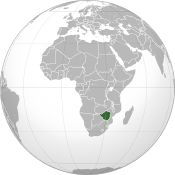Zimbabwean opposition leader rejects calls for power sharing talks
Wednesday, July 2, 2008

Morgan Tsvangirai, leader of the Zimbabwean opposition party Movement for Democratic Change (MDC), says he will not participate in power sharing negotiations with President Robert Mugabe, who was widely accused of using violence and intimidation to win Sunday's run-off election.
The opposition leader, Mugabe's only rival in the election before dropping out due to fears of violence, cited South African President Thabo Mbeki's role as mediator in the conflict, as appointed by the Southern African Development Community (SADC). Tsvangirai has often criticized Mbeki for failing to publicly condemn Robert Mugabe, and has repeatedly called for him to step down.
Tsvangirai says that "no meaningful progress can be made toward resolving the Zimbabwe crisis" if the SADC or the African Union does not appoint at least one other mediator. "If this does not happen," he says, "then the MDC will not be part of the mediation process."
He added, "If dialogue is to be initiated, it is essential that ZANU-PF stops the violence, halts the persecution of MDC leaders and supporters." The MDC says that 9 of its supporters have been killed by the state since the run-off, bringing the death toll up to at least 95.
Earlier on Tuesday, leaders at an African Union summit voiced their support for dialogue aimed at the creation of a unity government in Zimbabwe. "We encourage President Mugabe and opposition leader Morgan Tsvangirai to honour their commitment to initiate dialogue with a view to promote peace, stability, democracy and reconciliation in Zimbabwe," the AU said in a statement.
While the opposition rejected the idea of discussion, the Zimbabwe government called it a "welcome resolution", as stated by Information Minister Sikhanyiso Ndlovu. "Government is ready for dialogue with anyone," he said, "so long as it isn't dialogue concocted by the West." In his inauguration speech, Mugabe had said he was open to negotiations.
Tsvangirai believes that if a unified government were to be created, it should be based on the results of the original March 29 election, in which he received more votes but not enough to avoid a run-off. "We remain committed to negotiations or talks, call them what you will, but they should be based on the fact that we won the last credible election on March 29," Tsvangirai said. "Then we can move towards some transitional arrangement."
The European Union agrees with Tsvangirai on this point. Taking into account the March 29 vote, EU spokesman John Clancy says, "it's clear that [Tsvangirai] should be a leading member of that government as its potential prime minister or the head of government to ensure that certain reforms can take place." The EU had been placing pressure on the African Union to take strong measures against Mugabe's government.
Sources
edit- Associated Press. "Tsvangirai rejects S. Africa president as political mediator" — USA Today, July 2, 2008
- Luyanda Makapela. "Zimbabwe: AU Calls for Government of National Unity in Zimbabwe" — AllAfrica, July 2, 2008
- Brian Latham, Mike Cohen. "Zimbabwe Government Welcomes Call for Power Sharing" — Bloomberg L.P., July 2, 2008
- "Zimbabwean Opposition Leader Rejects Calls For New Unity Government" — RTTNews, July 2, 2008
- Tendai Maphosa. "EU Pushes Unity Government in Zimbabwe" — Voice of America, July 2, 2008

